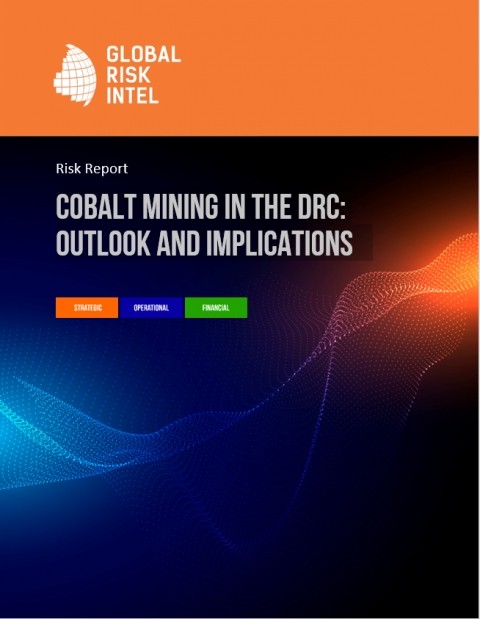Congo's Cobalt Export Restrictions: Implications For The Global Cobalt Market And Supply Chain

Table of Contents
The DRC's Role in Global Cobalt Production and its Economic Dependence
The DRC accounts for a staggering percentage of global cobalt production, making it a linchpin in the supply chain for electric vehicle batteries, smartphone batteries, and numerous other technological applications. This dominance translates into significant economic reliance on cobalt exports for the DRC's government. Cobalt revenue contributes substantially to the national budget, funding crucial public services.
- Dominant Producer: The DRC's share of global cobalt production dwarfs that of other countries, giving it considerable leverage in the international market.
- Economic Reliance: Cobalt exports are a cornerstone of the DRC's economy, impacting its financial stability and development plans.
- Social and Environmental Impacts: Much of the DRC's cobalt is extracted through artisanal mining, raising serious concerns about human rights, worker safety, and environmental degradation. These practices often lack proper regulation and oversight, leading to significant social and environmental costs.
Types of Cobalt Export Restrictions and Their Potential Motivations
The DRC government might implement various types of cobalt export restrictions, each with distinct implications:
- Quotas: Limiting the volume of cobalt exported.
- Taxes: Increasing taxes on cobalt exports to generate more revenue.
- Bans: Complete prohibition of raw material cobalt exports, pushing for greater domestic processing.
Motivations behind such restrictions are multifaceted:
- Increased Domestic Processing: The DRC may seek to add value to its cobalt resources by refining it domestically, creating jobs and boosting its economy.
- Revenue Generation: Higher taxes or quotas could significantly increase government revenue.
- Environmental Concerns: Restrictions could be a response to environmental damage caused by unregulated mining practices.
- Political Leverage: Export restrictions could be used as a tool for political negotiation or pressure on international actors.
Impact on the Global Cobalt Market and Pricing
Cobalt export restrictions from the DRC would undoubtedly create ripples throughout the global cobalt market:
- Price Volatility: Reduced supply would likely lead to significant price increases, impacting the affordability of electric vehicles and other cobalt-dependent technologies.
- Supply Chain Disruption: Manufacturers relying on DRC cobalt would face supply shortages, potentially delaying production and disrupting their business models. This affects everyone from miners to battery manufacturers and ultimately consumers.
- Impact on Supply Chain Actors: Miners may see increased profits, while refiners and battery manufacturers face higher input costs and potential production slowdowns. Technology companies would face rising component costs, potentially impacting product pricing.
Alternative Cobalt Sources and Their Limitations
While other countries produce cobalt, their combined output is nowhere near sufficient to replace the DRC's contribution. These alternative sources have limitations:
- Lower Production Volumes: Alternative sources cannot meet the current global demand, even if fully exploited.
- Higher Production Costs: Cobalt from alternative sources often comes at a higher cost, impacting product prices.
- Geopolitical Risks: Relying on a smaller number of diverse sources introduces new geopolitical risks.
Geopolitical Implications and International Relations
The DRC's cobalt export restrictions have significant geopolitical implications:
- Increased Geopolitical Tensions: Supply disruptions could exacerbate existing geopolitical tensions, as countries compete for access to this crucial resource.
- International Cooperation: International organizations and governments will play a crucial role in managing the cobalt market and addressing the challenges posed by export restrictions.
- Trade Disputes and Sanctions: The possibility of trade disputes and sanctions cannot be ruled out if the restrictions are perceived as unfair or discriminatory.
Strategies for Mitigating the Impact of Cobalt Export Restrictions
Mitigating the negative impacts of DRC cobalt export restrictions requires a multi-pronged approach:
- Diversification of Cobalt Sources: Investing in and developing alternative cobalt sources is crucial to reduce reliance on a single dominant supplier.
- Responsible Sourcing and Ethical Mining Practices: Promoting responsible mining practices in the DRC and other cobalt-producing countries is essential to ensure environmental protection and worker rights. This includes promoting fair wages and safe working conditions.
- Technological Innovation: Investing in battery technologies that require less cobalt or utilize alternative materials is critical for long-term sustainability. Cobalt recycling is also vital.
Conclusion: Navigating the Uncertainties of Congo's Cobalt Export Restrictions
The potential for cobalt export restrictions from the DRC presents significant challenges for the global cobalt market and supply chain. Understanding the complexities of this market is crucial for businesses, governments, and consumers alike. Price volatility, supply chain disruptions, and geopolitical tensions are all potential consequences. Collaborative efforts between governments, industry, and civil society are essential to ensure a stable and sustainable cobalt market. We need to prioritize responsible sourcing, ethical mining practices, and technological innovation to reduce reliance on the DRC and mitigate the risks associated with Congo's cobalt export restrictions. Stay informed about developments concerning Congo's cobalt export restrictions and engage in discussions promoting responsible sourcing and sustainable cobalt practices.

Featured Posts
-
 Eau Du Robinet Polluee Solutions De Filtration Et Conseils Pratiques
May 16, 2025
Eau Du Robinet Polluee Solutions De Filtration Et Conseils Pratiques
May 16, 2025 -
 Antisemitische Beleidigung Und Hitlerruf Kind In Berlin Von Unbekannten Angegriffen
May 16, 2025
Antisemitische Beleidigung Und Hitlerruf Kind In Berlin Von Unbekannten Angegriffen
May 16, 2025 -
 Florida Welcomes Foot Lockers New Global Headquarters
May 16, 2025
Florida Welcomes Foot Lockers New Global Headquarters
May 16, 2025 -
 Andor Season 2 Exploring The Possibility Of Rebels Crossovers
May 16, 2025
Andor Season 2 Exploring The Possibility Of Rebels Crossovers
May 16, 2025 -
 In Quale Acqua Troviamo Piu Microplastiche
May 16, 2025
In Quale Acqua Troviamo Piu Microplastiche
May 16, 2025
